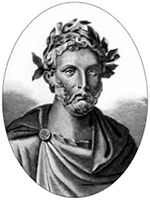Plautus: Ancient Roman Playwright
Plautus was one of the most playwrights of Ancient Rome. His works inspired great audience in his time and great admirers in later times. 
He was born Titus Maccius Plautus (and some sources question the veracity of this) in Sarsina, Italy, in about 254 B.C. Not much is known for certain of his early life. He is thought to have at some point worked in the theater, mainly because of his knowledge of its conventions and requirements. Whether he worked on the stage or behind it (or neither) cannot be said for certain. Surviving are a total of 20 complete plays of his, of which some of the most recognizable are Amphitruo, Miles Gloriosus, The Pot of Gold, The Rope, Stichus, Pseudolus, and Menacehmi. Fragments of a few dozen also have survived. His plays (and he is thought to have written 130 in all) are almost exclusively based on Greek originals, in the New Comedy vein of Menander. Plautus was fond of the "clever slave" as a motif: A person who was enslaved to another would be much more intelligent, wise, craft, or all of those and more, compared to his "owner." The playwright would use this dynamic to comic effect, creating laughter at the expense of the lesser intelligent or crafty of the two–in other words, the non-slave. One particularly helpful device for advancing this kind of comic argument was to set a play at Saturnalia, an ancient Rome festival during which slaves and their "owners" reversed their roles–for a limited time. Other familiar character types in Plautus plays included these:
Another familiar tactic used by the playwright was a series of events that unfolded based on a misunderstanding. As well, a case of mistaken identity could lead to all sorts of comic events. He was also fond of alliteration, puns, and other forms of wordplay. Plautus is thought to have died in 184 B.C. His plays were popular during his lifetime and on the stage for about another 100 years or so after he died. Copies of his plays were maintained and provided subsequent generations with rich characterizations and valuable snapshots of what made Romans laugh in the first two centuries B.C. |
|
Social Studies for Kids
copyright 2002–2026
David White




